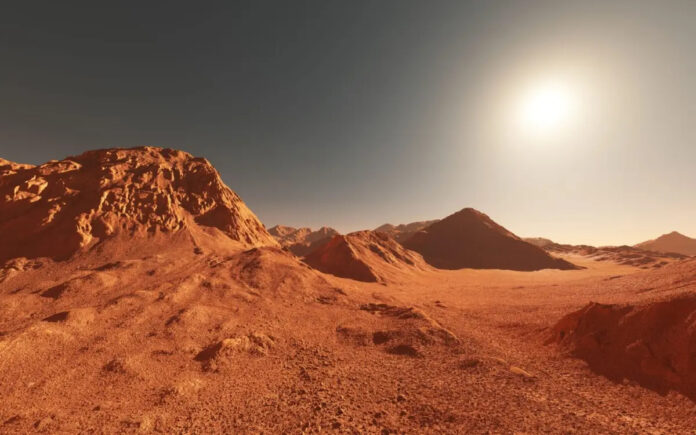New York: Scientists have uncovered the earliest known evidence of hot water on Mars, offering significant insights into the Red Planet’s potential to harbor life in its ancient past. The breakthrough, reported by Space.com, centers around a 4.45-billion-year-old zircon grain found in the Martian meteorite NWA7034, famously known as “Black Beauty”.
‘Black Beauty’: A Window Into Mars’ Ancient History
Discovered in the Sahara Desert in 2011, Black Beauty is one of the most thoroughly studied Martian meteorites due to its exceptional age and composition. While the rock itself is estimated to be around 2 billion years old, researchers at Curtin University identified something much older within it: traces of water-rich fluids dating back to Mars’ pre-Noachian period. This finding suggests that Mars may have been capable of supporting life during its earliest history.
“We used nano-scale geochemistry to detect elemental evidence of hot water on Mars 4.45 billion years ago,” explained Aaron Cavosie of Curtin’s School of Earth and Planetary Sciences.
Hydrothermal Systems: A Crucial Ingredient for Life
The researchers found that elements like iron, aluminum, yttrium, and sodium were introduced to the zircon grain during its formation. These chemical markers indicate that water was present during early magmatic activity on Mars.
“Hydrothermal systems were essential for the development of life on Earth, and our findings suggest Mars also had water, a key ingredient for habitable environments, during the earliest history of crust formation,” Cavosie added.
The discovery aligns with long-standing evidence of ancient rivers and lakebeds on Mars, particularly from its Noachian period about 4.1 billion years ago. However, this study takes the timeline further back, revealing that liquid water existed during the even earlier pre-Noachian period.
Also Read | Ukrainians Return to Russian-Controlled Donbas Amid Limited Support
Zircon Grain: A Survivor of Mars’ Turbulent Past
This research builds on earlier findings that identified the zircon grain as the first and only known “shocked” zircon from Mars, meaning it endured the extreme conditions of a meteorite impact.
“This new study takes us a step further in understanding early Mars by identifying tell-tale signs of water-rich fluids from when the grain formed,” Cavosie noted. The findings provide critical geochemical insights into the planet’s oldest crust, opening new doors for understanding Mars’ ancient potential for habitability.



